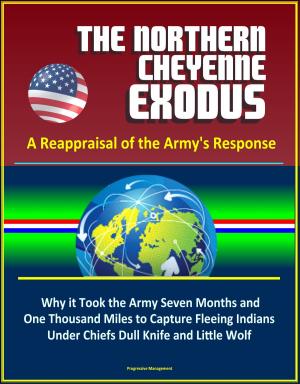Mission Command and the Starfish Organizational Models: A Comparison of Organizational Philosophies in a Decentralized Combat Environment - Auftragstaktik and History of the Waygal Valley
Nonfiction, History, Military, Strategy| Author: | Progressive Management | ISBN: | 9780463963166 |
| Publisher: | Progressive Management | Publication: | May 4, 2018 |
| Imprint: | Smashwords Edition | Language: | English |
| Author: | Progressive Management |
| ISBN: | 9780463963166 |
| Publisher: | Progressive Management |
| Publication: | May 4, 2018 |
| Imprint: | Smashwords Edition |
| Language: | English |
This excellent report has been professionally converted for accurate flowing-text e-book format reproduction.
This study compares the differences and similarities between the U.S. Army's Mission Command philosophy and the decentralized "Starfish" philosophy as applied to a decentralized combat environment. The Attack on the Ranch House battle that took place in Afghanistan provides a prime example of the execution of Mission Command within a U.S. unit, but not necessarily with its Coalition partners. This case study suggests that the U.S. Army's understanding of Mission Command philosophy along with the principles of the "Starfish" can help bridge that gap between the U.S. and its Coalition partners, especially in a decentralized environment. Not bridging the gap may adversely affect the future of military success against future decentralized threats.
The U.S. Army provided an alternative to the hierarchical transactional leadership style to better adapt in new environments through the use of Mission Command. Likewise, private businesses have utilized the "Starfish" decentralized model to overcome challenges in new environments. Each provides an excellent example of leaders attempting to adapt to changing environments. This paper will explore the potentials of a blending of the two philosophies by addressing the following questions using a selected case study from Afghanistan.
This research is composed of five chapters: (1) Introduction, (2) Literature Review, (3) Research Methodology, (4) Analysis, (5) Conclusions and Recommendations. Chapter 1 sets the conditions, significance, and relevance of the study, and formalizes the hypothesis and research questions that aim to validate or invalidate the study. Chapter 2's Literature Review discusses the historical relevance of Mission Command by discussing Auftragstaktik, the Mission Command Philosophy, the "Starfish" philosophy as described by Ori Brafman, and a historical background on the case study. In addition, this section provides some new terms key principles to the "Starfish" philosophy. The Research Methodology in chapter 3 argues the importance of the Case Study chosen to illustrate the hypothesis and thesis of this paper. In addition, this section defines the Case Study Methodology and provides an overview and a detailed explanation of the six questions asked about Mission Command and the five questions asked on the "Starfish" theory. Chapter 4 provides analysis of the case study and includes an in depth application of the principles of the two separate philosophies seeking illumination for the secondary questions using the case study. Finally, the conclusion in chapter 5 provides conclusions to the analysis, and recommendations. Further, it recommends future research.
CHAPTER 1 INTRODUCTION * Overview * Primary Research Question * Secondary Questions * Importance * Definitions * Limitation * Delimitations * Conclusion * CHAPTER 2 LITERATURE REVIEW * Introduction * Auftragstaktik: Origin of Decentralized Philosophy * Mission Command Philosophy * Starfish Theory * History of the Waygal Valley * Chapter Summary * CHAPTER 3 RESEARCH METHODOLOGY * Introduction * Selection of the Case Study * Case Study Method and Analytical Criteria * Mission Command Principle Questions * Starfish Theory Questions * Data Collection * Summary * CHAPTER 4 * Introduction * Case Overview: Attack on the Ranch House, Afghanistan, August 2007 * Analysis * Mission Command * Question One: Cohesive Teams * Question Two: Shared Understanding * Question Three: Clear Intent * Question Four: Disciplined Initiative * Question Five: Mission Orders * Question Six: Prudent Risk * Starfish * Question One: Circles * Question Two: Catalyst * Question Three: Ideology * Question Four: Preexisting Network * Question Five: Champion * Ranch House Case Study Analysis * Summary * CHAPTER 5 CONCLUSIONS AND RECOMMENDATIONS * Introduction * Conclusions
This excellent report has been professionally converted for accurate flowing-text e-book format reproduction.
This study compares the differences and similarities between the U.S. Army's Mission Command philosophy and the decentralized "Starfish" philosophy as applied to a decentralized combat environment. The Attack on the Ranch House battle that took place in Afghanistan provides a prime example of the execution of Mission Command within a U.S. unit, but not necessarily with its Coalition partners. This case study suggests that the U.S. Army's understanding of Mission Command philosophy along with the principles of the "Starfish" can help bridge that gap between the U.S. and its Coalition partners, especially in a decentralized environment. Not bridging the gap may adversely affect the future of military success against future decentralized threats.
The U.S. Army provided an alternative to the hierarchical transactional leadership style to better adapt in new environments through the use of Mission Command. Likewise, private businesses have utilized the "Starfish" decentralized model to overcome challenges in new environments. Each provides an excellent example of leaders attempting to adapt to changing environments. This paper will explore the potentials of a blending of the two philosophies by addressing the following questions using a selected case study from Afghanistan.
This research is composed of five chapters: (1) Introduction, (2) Literature Review, (3) Research Methodology, (4) Analysis, (5) Conclusions and Recommendations. Chapter 1 sets the conditions, significance, and relevance of the study, and formalizes the hypothesis and research questions that aim to validate or invalidate the study. Chapter 2's Literature Review discusses the historical relevance of Mission Command by discussing Auftragstaktik, the Mission Command Philosophy, the "Starfish" philosophy as described by Ori Brafman, and a historical background on the case study. In addition, this section provides some new terms key principles to the "Starfish" philosophy. The Research Methodology in chapter 3 argues the importance of the Case Study chosen to illustrate the hypothesis and thesis of this paper. In addition, this section defines the Case Study Methodology and provides an overview and a detailed explanation of the six questions asked about Mission Command and the five questions asked on the "Starfish" theory. Chapter 4 provides analysis of the case study and includes an in depth application of the principles of the two separate philosophies seeking illumination for the secondary questions using the case study. Finally, the conclusion in chapter 5 provides conclusions to the analysis, and recommendations. Further, it recommends future research.
CHAPTER 1 INTRODUCTION * Overview * Primary Research Question * Secondary Questions * Importance * Definitions * Limitation * Delimitations * Conclusion * CHAPTER 2 LITERATURE REVIEW * Introduction * Auftragstaktik: Origin of Decentralized Philosophy * Mission Command Philosophy * Starfish Theory * History of the Waygal Valley * Chapter Summary * CHAPTER 3 RESEARCH METHODOLOGY * Introduction * Selection of the Case Study * Case Study Method and Analytical Criteria * Mission Command Principle Questions * Starfish Theory Questions * Data Collection * Summary * CHAPTER 4 * Introduction * Case Overview: Attack on the Ranch House, Afghanistan, August 2007 * Analysis * Mission Command * Question One: Cohesive Teams * Question Two: Shared Understanding * Question Three: Clear Intent * Question Four: Disciplined Initiative * Question Five: Mission Orders * Question Six: Prudent Risk * Starfish * Question One: Circles * Question Two: Catalyst * Question Three: Ideology * Question Four: Preexisting Network * Question Five: Champion * Ranch House Case Study Analysis * Summary * CHAPTER 5 CONCLUSIONS AND RECOMMENDATIONS * Introduction * Conclusions















